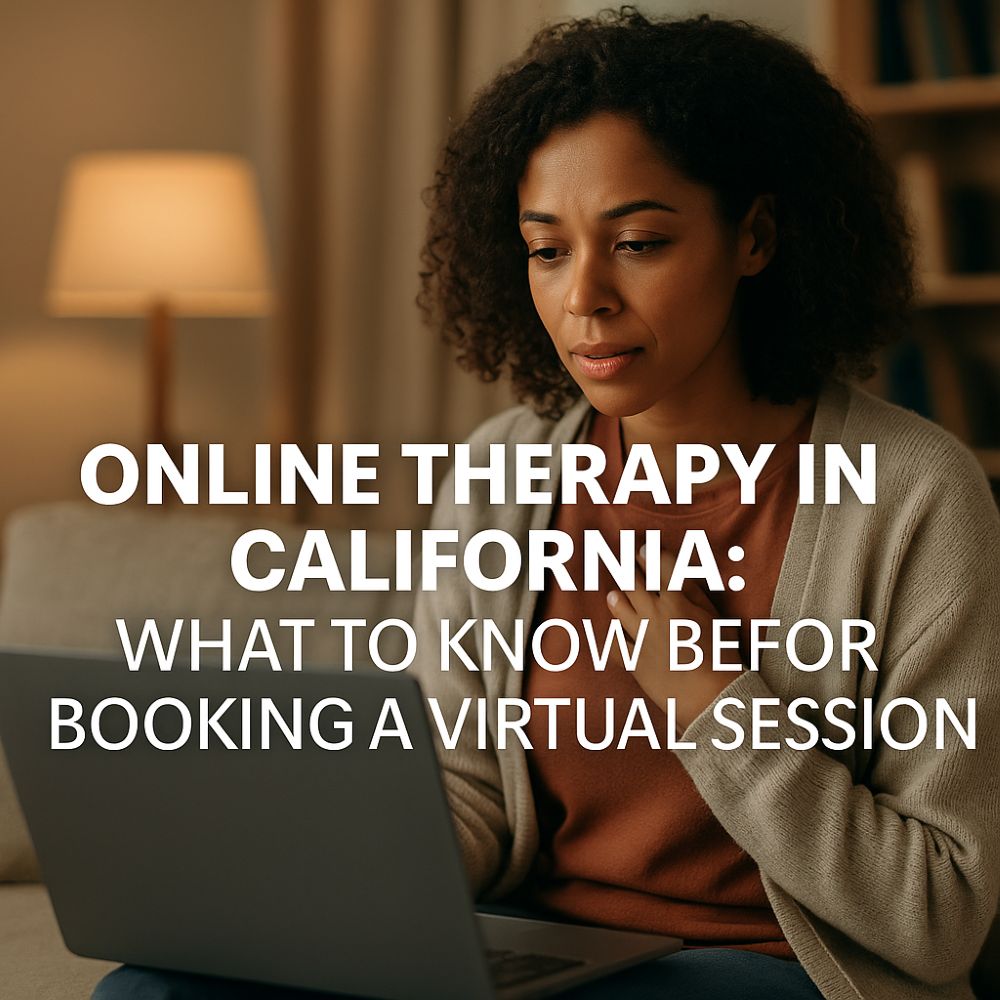If your days are a blur of emails, errands, reheated coffee, and wondering when “me time” became a mythical concept, you’re not alone. And let’s face it: therapy often ends up at the bottom of the list. That’s exactly why so many Californians are turning to online therapy—because, let’s be honest, if it doesn’t fit between Zoom meetings and snack time, it ain’t happening.
Virtual therapy makes getting support doable again—no traffic, no waiting rooms, no awkward small talk in the lobby. But even with all that convenience, one challenge remains: finding a therapist who’s not only licensed and affordable but actually gets what life looks like for someone like you.
This guide is here to help. I’ll walk you through what to expect from online therapy, how to choose someone who fits your real life—not just your insurance plan—and practical steps to make the process feel less overwhelming. Your mental health shouldn’t have to compete with a calendar full of other people’s needs.
📥 Ready to get started? Book your first virtual session now.
What is Online Therapy and How Does It Work?
Understanding Online Therapy
What is it and How It Differs from In-Person Therapy
Online therapy offers the same professional mental health support as traditional therapy—but without the commute, waiting rooms, or difficult office hours. Instead of meeting in a therapist’s office, you connect remotely via video calls, phone sessions, or secure text messaging.
Who Benefits Most from Online Therapy?
Virtual therapy is a great fit if you:
- Have a packed schedule and need flexibility.
- Manage work, kids, or caregiving.
- Prefer home-based support over commuting.
- Want access to a therapist who fits your lifestyle.
- Are seeking digital mental health support that adapts to you.
How You’ll Connect with Your Therapist
Choose from:
- Video Calls – Closest to in-person sessions.
- Phone Sessions – Good for those who prefer voice-only.
- Messaging/Chat Therapy – Great for ongoing, flexible support.
- Email Therapy – Ideal for reflection and written communication.
Typical Structure of an Online Therapy Session
- Before: Pick a private spot, check your tech.
- During: Check-in, guided conversation, support, and takeaways.
- After: Reflect, apply insights, schedule your next session.
Benefits of Online Therapy in California
Convenience and Accessibility
Reaching Remote and Underserved Communities
Online therapy removes geographic barriers, offering support even in rural or underserved areas across California.
Flexible Scheduling
Online sessions can be scheduled around your life—no commuting, no rearranging work or family obligations.
Cost-Effectiveness
Reduced Expenses
Avoid extra costs like parking, childcare, and lost work time.
More Insurance Plans Cover Virtual Therapy
Providers like Blue Shield, Kaiser Permanente, and Anthem Blue Cross now cover online sessions.
Privacy and Comfort
Reducing Stigma
Online sessions reduce fear of judgment and encourage open, honest discussions.
Comfortable Settings
Conduct therapy from the privacy of your own space, helping you feel more at ease.
📌 Prefer therapy from home? Find out why clients love it. Book here.
Considerations Before Booking a Session
Ensuring a High-Quality Therapy Experience
Verifying Credentials
Make sure your therapist is licensed in California. Use the California Board of Behavioral Sciences for confirmation.
Finding a Specialist
Choose a therapist experienced with your concerns, from trauma to parenting to anxiety.
Technology and Security
Internet Reliability
A stable internet connection is essential. Test your connection before sessions.
Privacy and Confidentiality
Use secure, HIPAA-compliant platforms. Avoid public Wi-Fi for sessions.
Insurance Coverage for Online Therapy in California
Understanding Your Coverage
Differences Between Plans
- Private Insurance: Often covers online therapy, but confirm details.
- Medicaid (Medi-Cal): Covers online therapy; ensure your provider is approved.
- Employer Plans: Varies; check with HR or your benefits administrator.
Key Questions to Ask
- Is online therapy covered?
- Are there session limits or authorizations?
- What are my costs?
- Do I need an in-network provider?
How to Choose the Right Online Therapist in California
Factors to Consider
Licensing and Specializations
Verify California licensing. Review areas of expertise to match your needs.
Reviews and Consultations
Use platforms like Psychology Today or TherapyDen. Schedule brief consultations.
Questions to Ask Before Your First Session
- What therapy approach do you use?
- How will progress be tracked?
📞 Still unsure? A quick consultation could clarify everything. Schedule yours today.
What to Expect in Your First Online Therapy Session
Preparing for Your Session
Setting Up for Privacy
Use a quiet, private space. Headphones can help with focus.
Managing Expectations
Be honest about concerns. Your therapist is there to guide you.
Session Structure
Intake and Assessment
Share your background and current challenges. This helps build a treatment plan.
Goal-Setting
Work with your therapist to set initial goals and define progress.
Frequently Asked Questions (FAQs)
- Is online therapy as effective as in-person sessions?
Yes—research confirms it’s equally effective for most issues. - How do I find a therapist who accepts my insurance?
Contact your insurer or search filtered directories. - What are the best platforms for online therapy in California?
BetterHelp, Talkspace, TherapyDen, and others. - Can I switch therapists if I’m not satisfied?
Yes. It’s common to try a few before finding the right fit. - How often should I attend online therapy?
Weekly is typical at first; adjust based on needs and progress.






